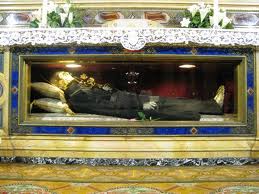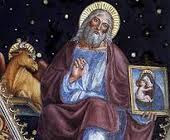All Saints Day! A day for true celebration. What could bring more happiness that rejoicing because we can celebrate a day of hoped for victory. Yes, we mark a special day when we pause our daily business and other pursuits to think about the community of saints ... our loved ones and friends who have the zip code 432836! Today is the day for all those who have accomplished the work God entrusted to them and have returned to be with him. It should a cause for joy to imagine how their lives must be in the promised land.
We recall that they completed this earthly live "marked with the sign of faith." With this thought we should be instigated to consider what it is that makes a saint. We might even be bold enough to look around to see what examples, what suggestions can be found in the lives of of those still with us about what sanctity actually means.
It is our common experience to hear questions put before those among us who reach extraordinary years, like 90, 100, 105 etc. "What advice would you give us for living a long life?" Today we should be thinking about those among who seem to have achieved what we would call a holiness of life. "How does a person become a saint?"
As simple as the question is so too is the answer: a saintly person possesses and is possessed by a genuine love of Jesus Christ. He is the goal, he is the mentor in their lives. you, my companion on the journey of faith, are saints in formation because I know you would not be reading these words were you not interested in following Jesus Christ. His footsteps are your road map to the Father God. Daily we are challenged to incorporate Jesus' life in whatever we do, whatever we say. We strive, like all the saints, to make each day of our lives a successful effort to be the saint God wants us to be.
So, we celebrate ourselves today as well -- that self that is seeking to fulfill our commitment to love the Lord our God with all that we are and to love the "neighbor" among us as we should love ourselves. Today is a reminder that sanctity begins with an honest loving of who I am: the person that God has sent with his graces and gifts into this world of ours to encourage and support others we know and love as well as those who see us but whom we may not personally know.
Yes, today is a day of genuine celebration of saintliness that exists among those who are with the Lord as well as those of us who continue to live the will of God in our world.
















